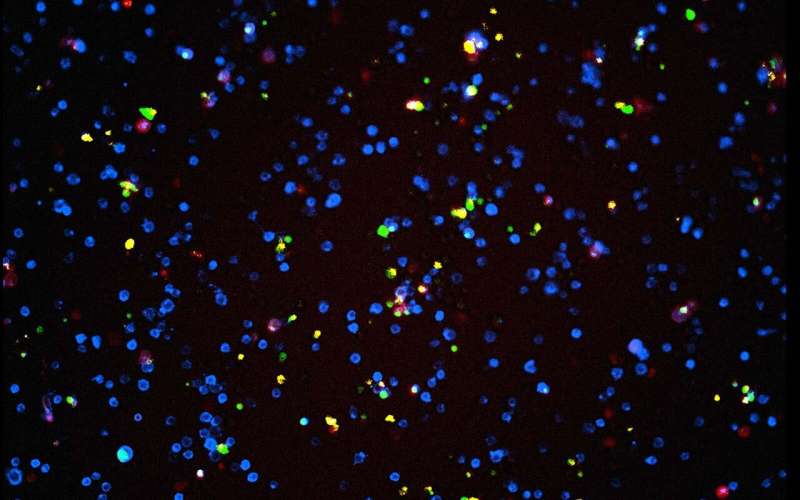New front opened in fight against common cancer driver

Walter and Eliza Hall Institute researchers have revealed a new vulnerability in lymphomas that are driven by one of the most common cancer-causing changes in cells.
The team revealed that the protein MNT is required for the survival of lymphoma cells that are driven by the protein MYC. Up to 70 percent of human cancers—including many blood cancers—have high levels of MYC, a protein which forces cells into abnormally rapid growth.
The research, led by Professor Suzanne Cory, Dr. Hai Vu Nguyen and Dr. Cassandra Vandenberg, suggests that potential therapies targeting MNT could be effective new treatments for MYC-driven cancers.
A new target
High levels of the MYC protein are found in up to 70 percent of human cancers. MYC controls hundreds of genes, driving rapid cell production, said Professor Cory, who has studied MYC-driven cancers since the early 1980s.
"For many years we hoped for a drug that could directly target MYC as a potential cancer treatment, but to date such inhibitors have been disappointing in the clinic," she said. "It became clear we needed to look for other vulnerabilities in MYC-driven cancers."
The team successfully identified a new target for tackling MYC-driven cancers by homing in on the role of a protein related to MYC, called MNT. Their research was published in the journal Blood.
By deleting the gene encoding MNT from MYC-driven lymphocytes—the type of immune cell from which lymphomas arise—the team found that MNT played a significant role in MYC-driven lymphoma development, Dr. Vandenberg said.
"In our laboratory models, the incidence of MYC-driven lymphomas was greatly reduced when MNT was absent. This showed us that MNT had a vital role at some stage during lymphoma development," she said.
"That role became clear when we found that pre-cancerous cells lacking MNT had high levels of apoptotic cell death," said Dr. Nguyen. "Thus, MNT is required to keep MYC-driven cells alive."
Toward better treatments
Dr. Nguyen said that the team went on to examine the impact of depleting MNT from fully malignant MYC-driven lymphomas. "When we did this, we saw that the tumor cells rapidly died," he said. "This suggests MNT could well be a promising new therapeutic target for MYC-driven lymphomas."
Professor Cory said the researchers would now look at whether MNT was important in other MYC-driven cancers.
"Inhibiting MNT may also make tumors more susceptible to other drugs such a BH3-mimetics which directly target the cell's death machinery.
"Although a lot of work remains to be done to develop and test a new MNT-inhibiting therapy, our discovery opens up a new front in tackling MYC-driven cancers," Professor Cory said.
More information: Hai Vu Nguyen et al. Development and Survival of MYC-driven Lymphomas Requires MYC-Antagonist MNT to Curb MYC-induced Apoptosis, Blood (2020). DOI: 10.1182/blood.2019003014



















